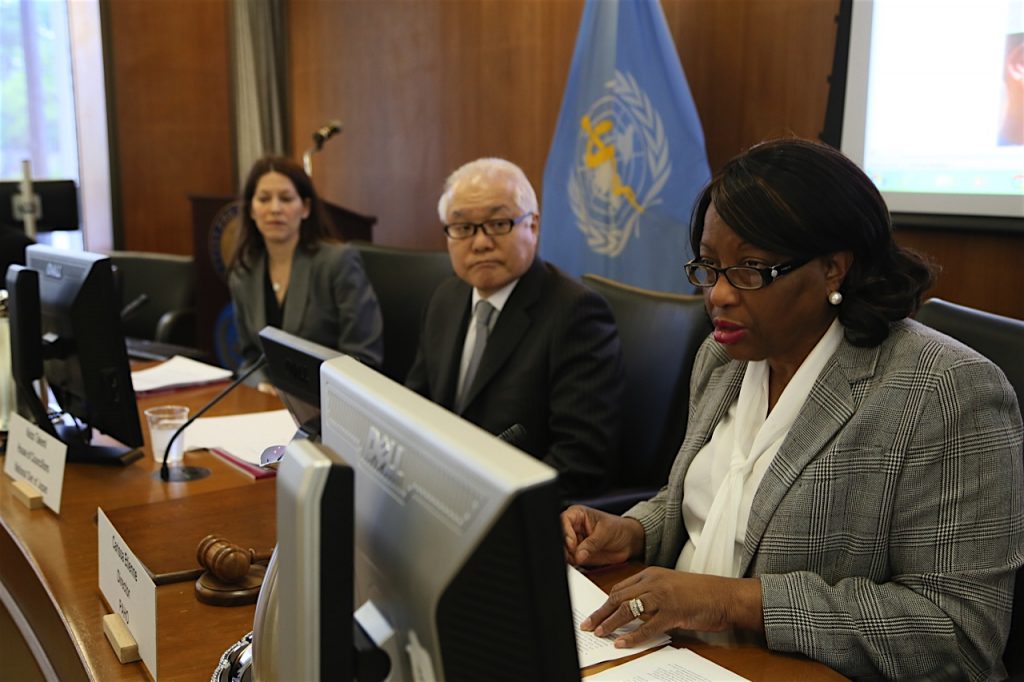In 2015, JCIE and the Pan American Health Organization/World Health Organization (PAHO/WHO) began a collaborative project to analyze case studies of how the human security approach is being implemented on the ground and how it can contribute to broader goals of health, resilience, and development. The project resulted in a report, Health, Resilience, and Human Security: Moving Toward Health for All. Those findings were shared broadly with policymakers and practitioners in the field through two seminars, one in New York at the UN Secretariat Building and one in Washington DC at the PAHO/WHO offices.
ORGANIZERS
Japan Center for International Exchange
Pan American Health Organization/World Health Organization (PAHO/WHO)
SPEAKERS
YUKIO TAKASU, Special Adviser to the UN Secretary-General on Human Security
KEIZO TAKEMI, Member, House of Councillors, National Diet of Japan; Senior Fellow, JCIE
JOY PHUMAPHI, Executive Secretary, African Leaders Malaria Alliance (ALMA); former Minister of Health, Botswana
SUSAN HUBBARD, Senior Associate, JCIE/USA
MARCELO KORC, Advisor, PAHO/WHO
As the international community’s development agenda transitions from the era of the Millennium Development Goals (MDGs) to that of the Sustainable Development Goals (SDGs) and the 2030 Agenda, the time is ripe to revisit human security and explore its practical implications for the new development agenda. Echoing human security principles, the 2030 Agenda emphasizes a “world free of poverty, hunger, disease and want…free of fear and violence…with equitable and universal access to quality education, health care and social protection.” It calls for development strategies that result in more resilient societies where people are safe from chronic threats such as ill health, abject poverty, hunger, disease, violence, and repression, and are protected from sudden and hurtful disruptions in their daily lives.
How can “human security” provide a framework for achieving those goals, and particularly SDG3, which calls to “ensure healthy lives and promote well-being for all at all ages”? What does human security mean in practical terms? These were among the questions addressed at a forum held at the United Nations, co-organized by JCIE, PAHO-WHO, and the United Nations Trust Fund for Human Security. Nearly 100 UN ambassadors, officials, and experts gathered to hear the findings of the joint JCIE-PAHO report on Health, Resilience, and Human Security and to discuss how those lessons can be applied moving forward.
Amb. Yukio Takasu opened the meeting by discussing the SDGs and the key role of health within those goals. He noted that while it is often said there can be no development without peace and no peace without development, you can have neither peace nor development without health. In his keynote speech, Hon. Keizo Takemi applauded the release of the new JCIE-PAHO report on human security, describing Japan’s contribution to the development of the concept and how it has been integrated into Japan’s foreign policy. Joy Phumaphi offered a developing country perspective and noted that while the definition of human security seems simple, it has profound implications for the developing world. She stressed that the multisectoral and multidimensional approach offered by human security is needed for a comprehensive development framework. Susan Hubbard and Marcelo Korc then shared the findings of the report they co-authored, highlighting the principles of and opportunities offered by the human security approach.
ORGANIZERS
Japan Center for International Exchange
Pan American Health Organization/World Health Organization (PAHO/WHO)
SPEAKERS
CARISSA ETIENNE, Director, PAHO/WHO
KEIZO TAKEMI, Member, House of Councillors, National Diet of Japan; Senior Fellow, JCIE
SUSAN HUBBARD, Senior Associate, JCIE/USA
MARCELO KORC, Advisor, PAHO/WHO
EDNA YOLANI BATES, Secretary of Health, Honduras
TAYLOR SEYBOLT, Director, Ford Institute for Human Security, University of Pittsburgh
KIR FORTUNE, Advisor, Determinants of Health, PAHO/WHO

